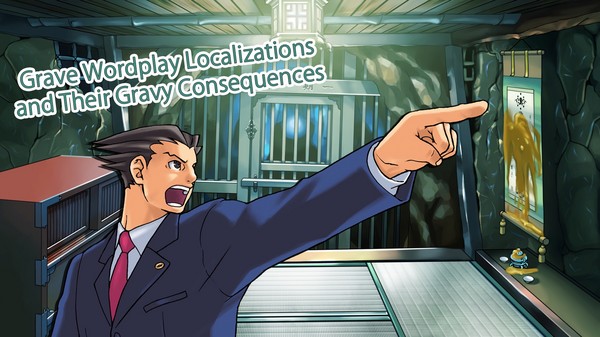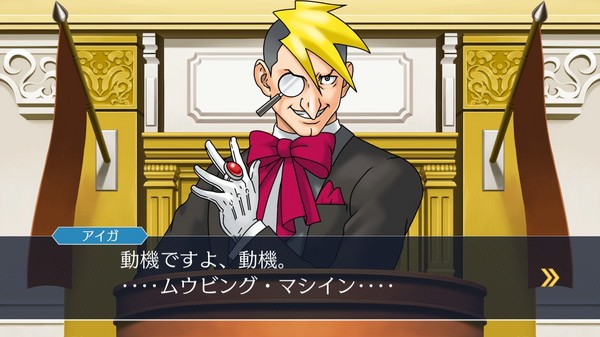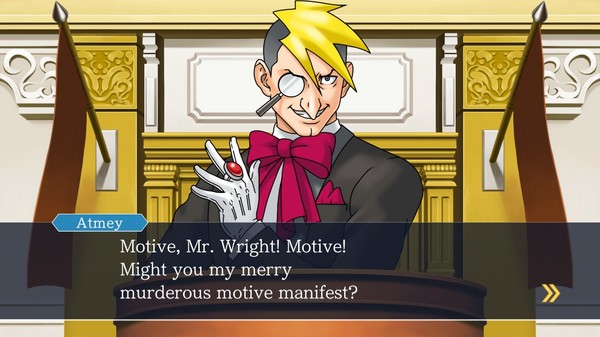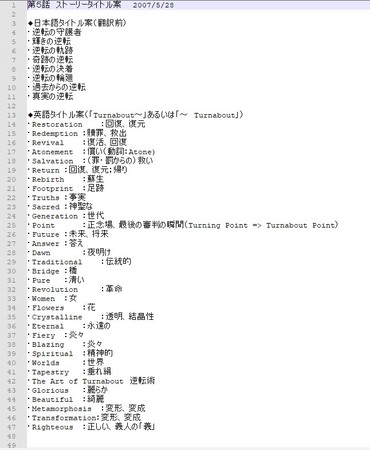
Ace Attorney: Grave Wordplay Localizations and Their Gravy Consequences
Mar 23, 2019 // Janet Hsu
Happy Friday, everyone! It’s me, Janet Hsu, back with another localization blog! We’re less than a month away now (April 9 th !) from the release of “Phoenix Wright: Ace Attorney Trilogy” on the Nintendo Switch, PlayStation 4, Xbox One, and Steam!
Whether you play the game in English or in Japanese, I’m sure the question of “I wonder what this pun is like in the other language?” comes up from time to time. After all, as a humor-based series, there are many elements that just wouldn’t make sense if it were literally translated, and that’s where localization comes in.
Spoilers for the third game, “Trials and Tribulations” are included, so beware!!!
The thing with localization is that it isn’t this one cookie-cutter process that can be applied to any and every game. It requires a lot of thought and effort to balance the needs of the game and the player’s expectation that they’ll be able to beat the game of their own volition, among other things. For example, a game that takes place in Japan can be localized in any number of ways. In an action game where the Japanese setting and/or cultural references don’t directly affect a player’s ability to clear said gme, the Japanese setting and the Japanese text within the game may be left as-is.
But as any player of Ace Attorney knows, text-based puzzles abound in visual novel mystery games, so the text must be adapted so that most people can solve the puzzles with general knowledge facts from their culture. And unlike other mediums such as manga and anime, on-screen subtitles and translation notes were simply a no-go, visually or otherwise on a screen as small as a Nintendo DS. Therefore, in order for a player to play and beat the games, all relevant Japanese text has to be localized.
But that’s a very technical way of viewing localization, isn’t it? The mechanics of finishing the game aside, another unique aspect of Ace Attorney is its humor, and what fun is it to play a comedy series if none of the jokes land properly? If the text were translated literally, you would end up with gibberish lines that make no sense. Take for example, one of Luke Atmey’s lines:

動機ですよ、動機。 ‥‥ムウビング・マシイン‥‥
Douki desu yo, douki. …Muubingu Mashiin…
If I were to translate this literally, the line would simply read:
“Motive, motive.
… moving machine…”
The second line is already the English words “moving machine” so in my literal translation, I should keep it as is, but then, where is the joke in that line? Why is it funny at all, you may ask? The answer is that it’s all in the wordplay.
動機 = motive
動 = to move
機 = machine
In the Japanese, Luke Atmey’s character quirk is to spout ridiculous phrases that the other characters can’t make heads or tail of. Therefore, him literally translating the 2 kanji characters that make up the word for “motive” (動機) into “moving machine”, and using a very unconventional Japanese spelling (normal spelling: ムービング・マシーン) is hilarious to a Japanese player.
The dilemma here in localizing this line was “how do we convey the same sentiment in English?” How do we show that Atmey is back to his usual ridiculous self through humor? Well, we took cues from the intent of the original Japanese: use Atmey’s trademark nonsense phrasing.

We intentionally made as many words start with “M” as possible to add that extra Atmey flair, and voila, a similar comedic line was created in the exact same vein as the Japanese.
Similarly, given how punny names and even signs in the background can be in this series, we had to focus more on capturing the essence of the text, rather than the literal meaning of the text itself.

Tender Lender’s motto “三日坊主” and “Win Through Compromise”
Take for example, Tender Lender’s motto, “Win Through Compromise” and its Japanese counterpart, “三日坊主”. “Mikka bouzu” (lit. “3-day monk”) is a fairly common phrase that is used to describe someone who is fickle or gets bored of things easily and who doesn’t see things through to the end. But in the hands of Tender Lender, both language versions use very unconventional interpretations of these everyday phrases to convey what terrible fate will befall anyone who doesn’t pay back their loan. In the Japanese version, Violetta interprets the phrase to mean “We make our clients as bald as monks in 3 days by stripping them of all their hair (aka: money)”, while in the English, she says that they win by “compromising” (aka: hurting) their clients.
Lastly, just in case you think localization only impacts short lines here and there, there is one tricky phrase that affected an entire episode. I’m talking, of course, of “Bridge to the Turnabout” or “華麗なる逆転” (“Karei naru Gyakuten” – The Magnificent Turnabout).

家元に、華麗に引導をたたきつけてやりなさい
Iemoto ni, karei ni indou wo tatakitukete yarinasai
Literally: Send the Master off with a glorious last rite.
As those who have played this episode know, the key to this word puzzle hinges on something we learned in the second game: namely, that Pearl isn’t very good at complex Japanese characters/reading in English. Here, she mistakes 華麗 (“karei” – gorgeous, magnificent) and 引導 (“indou” – last rites, funeral) for the similar-sounding words カレー (“karee” – curry) and インド (“indo” – India). So she misunderstands the sentence as having something to do with “Indian curry”.
In the English version, she gets “gravely” and “(to) roast” mixed up with “gravy” and “(meat) roast”, and thus she used the gravy for the pot roast that was served for dinner on the Master. The reason we chose to go with “gravy” for the word play was actually because we couldn’t change the color of the sauce, so we had to pick a brown sauce and go from there. I remember searching for phrasings that would work with things like steak sauce and even onion soup!
But all that aside, an unintended consequence of the wordplay needing to be localized was that it necessitated a change in the title of the episode itself. The word 華麗 (“karei”) held a lot of significance for the episode, and so the use of the word in the episode’s title was a nice callback in the Japanese version, but a simple word swap just wouldn’t do in the English version. “The Grave Turnabout” in English didn’t have the same sparkle and glory of the Japanese “The Magnificent Turnabout” (華麗なる逆転), so we set out to look for something else of significance that would make for an equally meaningful title.

Yeah… there were quite a few themes to choose from…
We brainstormed and brainstormed, and finally settled on “bridge” for a number of reasons, among which: 1) Dusky Bridge itself is pretty significant in the scheme of things, and 2) the trials and tribulations the characters endured were like a metaphorical bridge they had to cross to get to their futures, especially for Maya and her decision to claim the title of Master.
And there you have it! These examples were representative of just a few of the considerations we had to make while localizing the Ace Attorney games. If you’ve never tried before, I hope you’ll try to play them in different languages. It’s always neat to see how the more they differ, the more they remain the same.
I’ll be back in a bit for one last blog. In the meantime, Takumi-san will be here next week to shed some more light on his inspirations and the challenges he faced while creating the Ace Attorney games.
Until then!
-
Brands: Ace Attorney
-

Loading...
Platforms:
